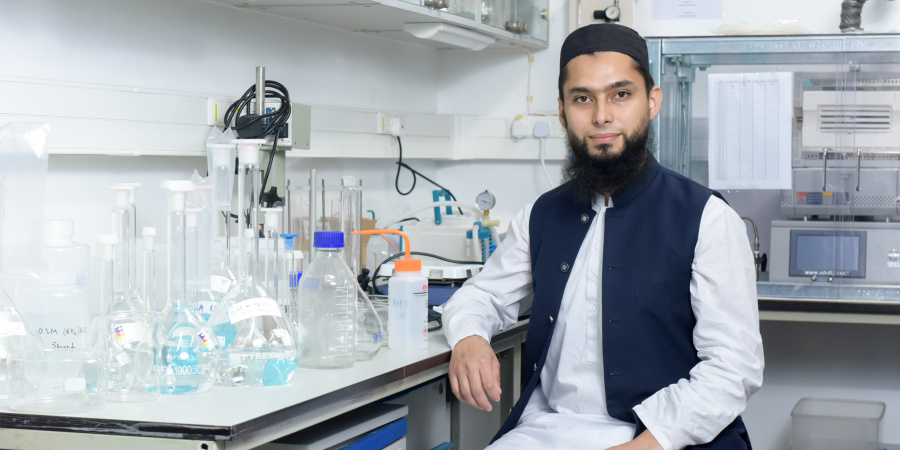Boosting Communication Skills for Holistic Researcher Development
As the first student from a Hong Kong university to win an award in the Asia-Pacific Three Minute Thesis (3MT®) Competition, Chemical and Biological Engineering PhD student Usman Bin SHAHID shares how the preparation process helped him find out simple answers to the why, what, and how of his thesis and realize the wider purpose of his research.
I was born and raised in Lahore, Pakistan, a city famous for its delicious food streets and unique cultural history. Growing up in the 90s watching “Dexter’s Laboratory” (a cartoon about a boy genius who had his very own secret lab where he would make really exciting cool things), I too always fancied myself in a lab of my own, making cool things that impacted the greater community.
It may have remained an unrealized dream, but when I first embarked on a 14-hour flight to Canada to undertake a bachelor’s degree in Chemical Engineering at McGill University, little did I know that this dream would ultimately turn into a reality. Although it was a tough decision, my parents supported me to pursue my childhood dreams and passions throughout this risky endeavor. While in undergrad, I had the opportunity to work as a summer student researcher in different labs, which further fueled my enthusiasm for research. Few years later, I was presented with the opportunity to pursue an MS in Sustainable Environment at Hamad Bin Khalifa University (HBKU) in Qatar. At HBKU, I worked with talented researchers who further encouraged me to apply for a PhD at the Hong Kong University of Science and Technology (HKUST). Attracted to its competitive research environment and excellent facilities, I made an application to HKUST and was quite fortunate indeed to secure a Hong Kong PhD Fellowship Scheme (HKPFS) award to begin my PhD in Chemical Engineering here.
My doctoral journey at HKUST has been a fascinating one. I have had the opportunity to interact with some great minds while, as one of the best institutions globally, HKUST combines the perfect tools and environment to extend your skills and achieve your goals.
In addition to research, for example, PhD students at HKUST must take a professional development course, with content ranging from presentation and writing skills to research ethics. In one of these sessions, I met Mr. Graham YOUNG, then a presentation skills training instructor, who really encouraged me to try out for the 3MT® Competition.
This contest challenges PhD students to explain their research to a non-specialist audience in 180 seconds. My thesis relates to electrochemical ammonia synthesis, and I had not attempted anything like this before, so I was a bit daunted at first. But a few sessions with Graham gave me the necessary confidence to enter. And would you believe it! I was named first runner-up in my first year in 2019 in the internal HKUST 3MT® Competition and again in my third year in 2021.
Even more exciting, the second time I was able to represent HKUST at the Asia-Pacific 3MT® 2021, where I eventually made it to the final round and won the People’s Choice Award. Reaching the top eight among 54 participants from around the globe was itself an honor for me. But being the first student from a Hong Kong university to win an award is an experience that words cannot do justice to – and will be the highlight of my tenure at HKUST.
I am grateful that I could participate in such a competition because it helped me develop essential skills for a successful academic career. I learned how to condense the why, what, and how of my thesis and its goal to achieve a brighter and cleaner future by sustainably producing ammonia – the second most-produced inorganic chemical in the world and a key ingredient for 90% of all fertilizers. This puts in perspective the wider purpose of your work and also enables you to share your work with literally everyone, from an eight-year-old to someone at 80! Such an achievement would not have been possible without the support of the School’s instructors, faculty members, and staff.
Indeed, the entire PhD experience at HKUST has been enlightening. As a researcher, the quality of work carried out for your PhD plays a critical role in defining your long-term career. An intellectual group of peers and a competitive environment push you to explore boundaries that may feel intimidating at times. However, through collaborative effort, you can overcome all challenges and make breakthroughs that genuinely revolutionize the field. This is something I truly cherish at HKUST.
Related link:

